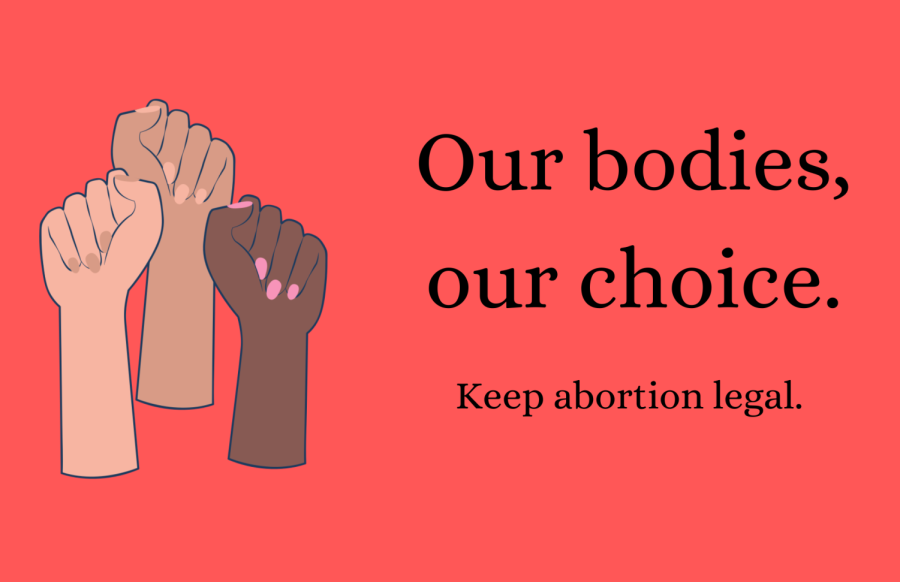A Plea For Roe
On May 2, a Supreme Court draft was leaked exposing their intentions of overruling Roe v. Wade.
Opponents of reproductive rights have been seeking for decades to overturn Roe v. Wade, and based on the leaked draft of a U.S. Supreme Court opinion, they may finally get their wish.
Roe v. Wade, a 1973 Supreme Court ruling that protects a woman’s right to choose, ensures that women are able to access abortions everywhere in the United States.
Former Justice Ruth Bader Ginsburg, a liberal member of the court for 27 years, was famously known for her support of the decision, and she always had the numbers on the Court to avoid a direct threat to Roe. However, after she passed away, women around the country began to worry for their reproductive rights. And the reasoning behind those concerns is quite logical, considering her seat was most likely going to be flipped, making the court majority conservative.
Since Justice Amy Coney Barrett joined the Court following Justice Ginsburg’s passing, more and more states have made it increasingly difficult for people to receive abortions. While lawmakers cannot make abortion illegal, they have found ways to make it nearly impossible for women to receive an abortion safely, or even to obtain an abortion at all. Some of the state laws have aimed specifically at giving the Supreme Court the opportunity to overturn Roe.
Opponents of Roe include not just abortion opponents but also some people who feel that making laws surrounding abortion falls under the duties of Congress, and therefore, the Supreme Court should not have ruled on this issue in the first place.
On May 2, Politico released the leaked draft in which the Supreme Court now appears, nearly a half century after its Roe v. Wade decision, to have majority support to overturn the landmark ruling. For many women, this new ruling would be a punch to the gut; it is horrifying to know that the liberty some worked so hard to obtain could be stolen away.
Not only will many states ban abortion itself as soon as they can, but there is discussion of banning the “Plan B” pill as well as prohibiting travel across state lines to obtain abortions.
One common misconception, though, is that abortion will now be illegal and unavailable in every state. Fortunately, in many places, there are laws to protect abortion and guarantee access to it.
Other states, however, have made it increasingly difficult—in some cases nearly impossible—to get abortions. Women have been prohibited from obtaining abortions after the first trimester. They have been required to attend counseling, and minors have been required to obtain parental consent. Additionally, the counseling often spreads false information about abortion. More recently, states have become increasingly aggressive, passing laws that prohibit abortion after six weeks—around the time most women find out they are pregnant.
Many organizations such as Planned Parenthood aim to make abortion easily accessible by offering them in health clinics and making the process as uncomplicated as possible. But states such as Texas require abortions to be performed in hospitals and restrict the use of tax dollars that may be used to support abortion.
As of now, 13 states have trigger laws in place that would immediately ban abortion as soon as Roe v. Wade is overturned.
Still, outlawing abortion doesn’t necessarily mean that abortion is going away. Abortions can be done without the assistance of medical professionals. Not safely, but they can be. And they will be.
Which raises the question, why is abortion being banned if it will be done anyway in a more dangerous and harmful way? Shouldn’t safety be encouraged and promoted?
At Latin, the Intersectional Feminist Alliance heads sent an email on May 3, saying, “We also want to acknowledge, because of historical patterns of oppression in the healthcare system, that people of color and economically disadvantaged individuals will be impacted the greatest by this decision. Please keep in mind that in the case that Roe falls, it will fall upon legislators to pass laws regarding abortion in the future; this means that your midterm votes matter in the fight for abortion rights.”
With midterms fast approaching, the electoral consequences of the Court’s potentially overturning Roe remain up in the air. After Donald Trump’s presidency, the United States had a record high voter turnout in 2020, and he was ultimately voted out of office. The Washington Post predicts that a Court ruling could have a meaningful impact this November.
The Supreme Court’s current leaning may stem in large measure from the religious beliefs of those serving on the Court. In Catholicism, abortion is strictly prohibited, and while not all devout Catholics are against abortion, many are. Six of the current Supreme Court justices are Catholic, although only five of them appear to oppose abortion.
Interestingly, in recent years, many Catholic countries have taken steps to legalize abortion. Ireland, for example, had banned abortion for over 35 years until beginning to loosen restrictions in 2018. Since then, the expansion of abortion has continued, and it has become a known and accepted right.
Additionally, Argentina, another Catholic country, has loosened the regulations on abortion, allowing it for the first 14 weeks of a pregnancy.
So once again, America seems to be moving backwards. And it is infuriating. If Roe v. Wade is to be overturned, it will be one of few instances throughout U.S. history in which the Supreme Court overruled a landmark court decision in a way that infringes on individual freedoms rather than expands them.
Seeing that the Supreme Court seems to have no problem rescinding the right to abortion, other highly-fought-for rights may be taken away as well. What will be gone next? Same-sex marriage? Sexual autonomy? Access to birth control?
In his draft opinion, Justice Samuel Alito argues that the 14th Amendment protects only rights that were built off of former laws. In regards to a newer decision, Washington v. Glucksberg, Alito writes that physician-assisted suicide is “deeply rooted in this nation’s history and tradition” and “implicit in the concept of ordered liberty.” His argument is that the Court shouldn’t protect the right to abortion because it is neither enumerated in the Constitution nor “deeply rooted” in U.S. history, but the Court could use this logic to reduce or eliminate protections of many other rights.
If abortions are fully banned in certain states, the birth rate is likely to increase. But with the growing birth rate comes a potential uptick in children in the foster care system, which ultimately costs state governments more money.
In one of her many appeals against abortion, Justice Barrett said, “Why don’t the safe-haven laws take care of that problem?” She is of the belief that as long as people are allowed to abandon their babies legally and with no questions asked, it doesn’t make sense to keep abortion around. Justice Barrett herself has two adopted children.
In 2019, according to The Atlantic, it was found that the majority of women find giving up a child more difficult than choosing abortion. Not only will restricting abortion cost the government more, but it will also negatively impact the mental health of women and those who are unable to support or safely take care of a child for any reason.
As with most controversial issues, there are valid arguments on both sides of the abortion debate.
To some, abortion is murder. But given that a fetus is not able to live outside the womb for the first 24 weeks, this still allows a significant amount of time for terminating a pregnancy before doing so involves a fetus that is viable.
There is also the concern that a fetus might be in pain during an abortion. But studies show that until six months, when a fetus’s brain is fully developed and has a sustainable nervous system, they are unable to feel pain.
It used to be believed that abortion can cause breast cancer, but this myth has been debunked.
And abortion procedures used to be more dangerous for women, but with the developement of modern medicine, abortions have become safer, at least when medical professionals are permitted to be involved.
So all of this is a plea. A plea for Roe. To maintain what so many individuals worked so hard for. To give women choice concerning their own bodies, and the right to make essential decisions about themselves and their lives.
There are so many instances in which a person might need an abortion. For their safety, their wellbeing, or their personal needs. This decision should not be dictated by the government, the justice system, or anybody except for the person getting the abortion.
Roe v. Wade protects a person’s right to an abortion, yes, but it is also so much more than that. This law set the standard for many other human rights issues, and its reversal could metastasize far beyond the right to choose.
Additional resources on abortion can be found here:
The Chicago Center for Women
Planned Parenthood
Reproductive Health Access Project
National Abortion Federation
Information on Periods and Reproduction

Eliza Lampert (’24) is a senior at Latin and is overjoyed to serve as one of this year’s Editors-in-Chief. During her time writing for The Forum, she...





















































Eva • Jun 26, 2022 at 2:38 pm
Please sign this petition to protect abortion rights!
https://chng.it/sJ5FCm7x
John Harvey • Jun 17, 2022 at 10:58 am
Pro-choice people are being childish about the possible overturn of Roe v. Wade. Rather than wishing that courts would continue to pretend that there is a right to abortion in the constitution, pro-choice people should prepare for the extended task of guaranteeing a right to abortion in each state by legislation (perhaps merely by repealing state bans).